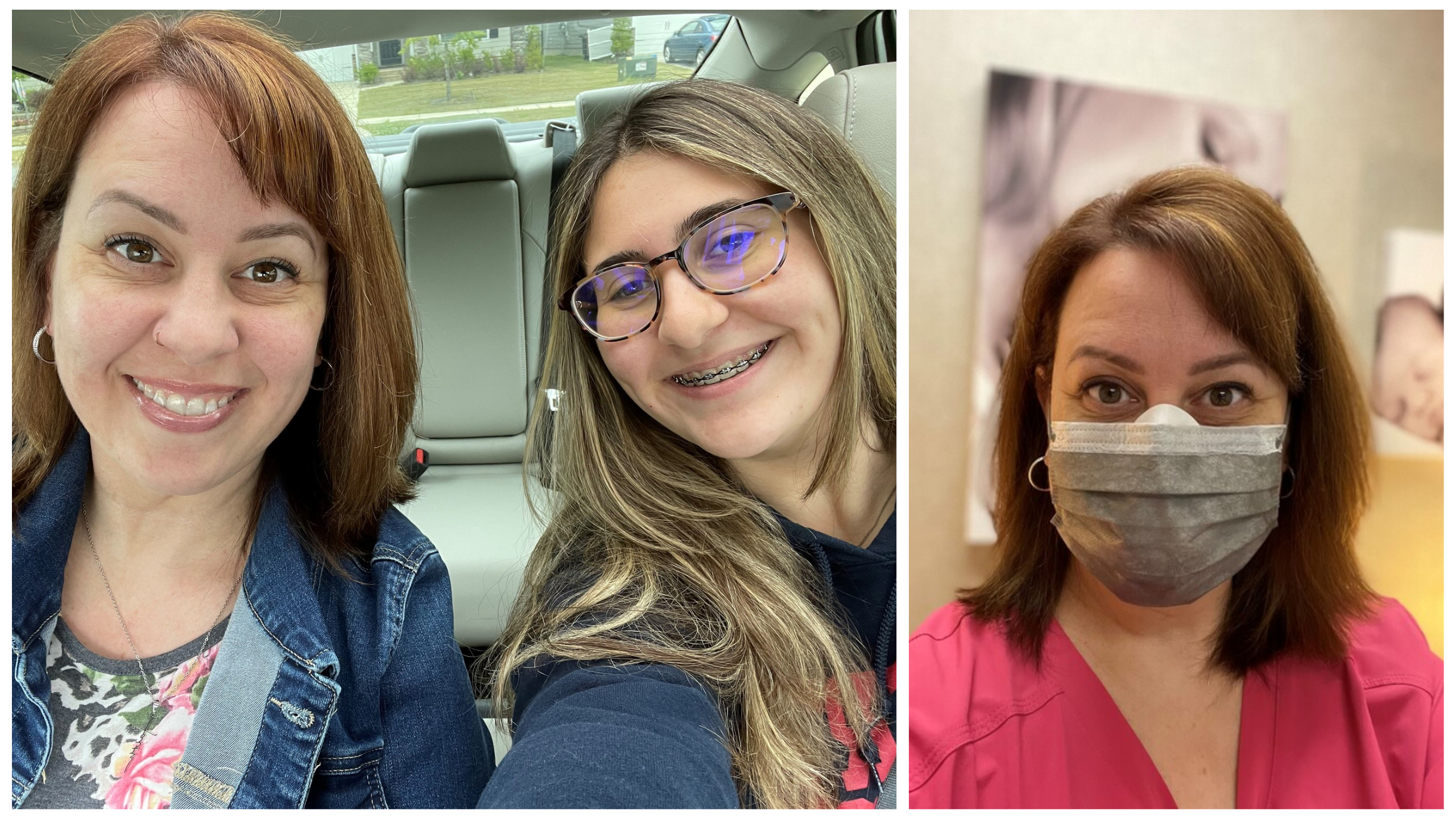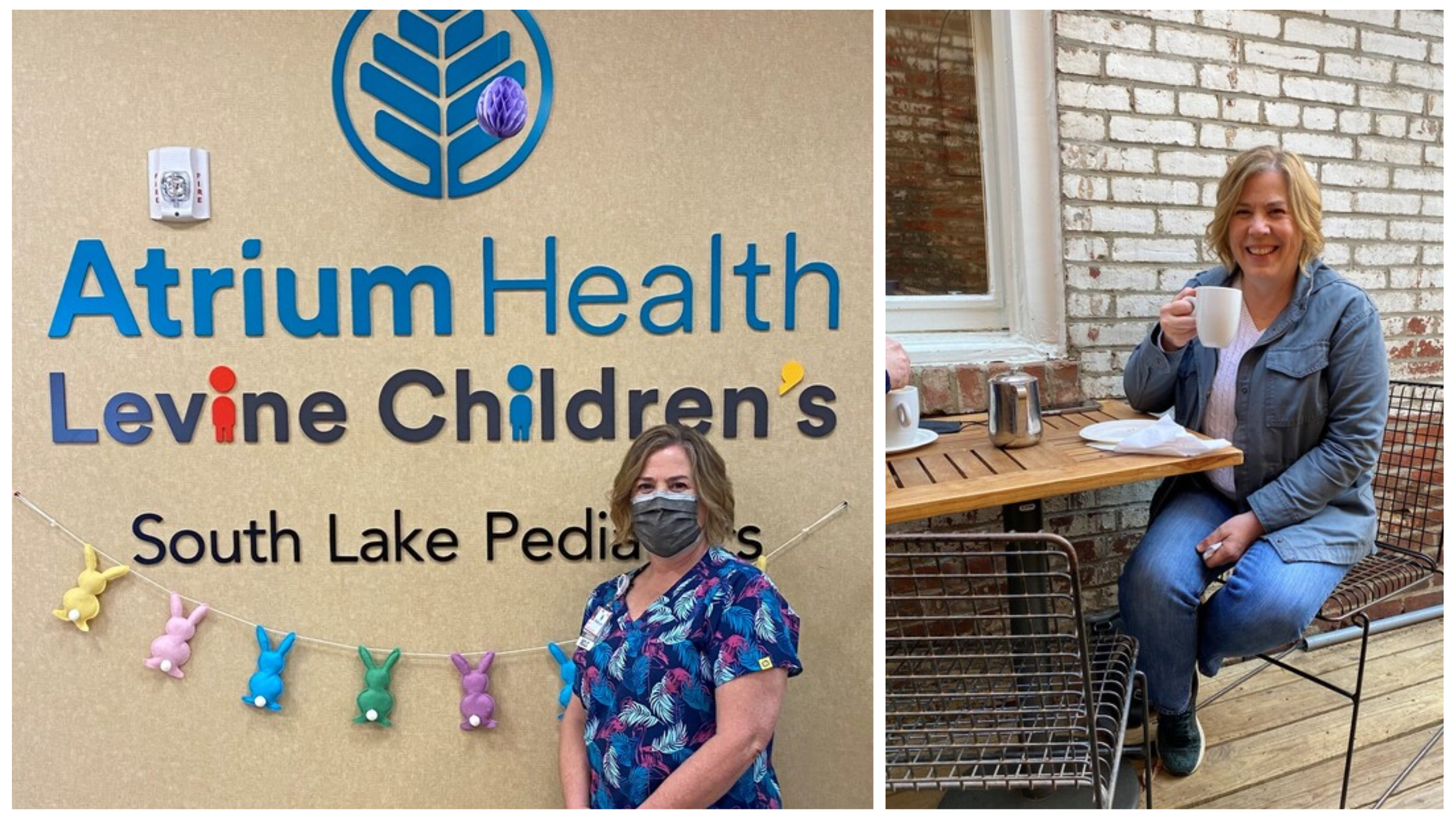Feeding your baby is a very personal decision. When a new mom decides to breastfeed, support from her partner, as well as healthcare providers, can increase the success rate. I nursed all 3 of my kids with very different experiences. I was lucky to have lactation support right in my pediatrician's office. Even as an experienced mom, by the time I had my 3rd child I still needed support and help to be successful. This week's Daily Dose article introduces some of the wonderful lactation consultants that you can see at 12 different doctor's offices and three hospital locations in the Atrium Health network. This article originally appeared in Daily Dose.
“Hi, mom. Here’s your baby,” the nurse says as she lays your newborn on your chest for skin-to-skin contact. What’s next? Breastfeeding. This is when you introduce your baby to their main source of nutrition for the next six months. No pressure. While it’s the most natural thing in the world, it doesn’t always come naturally.
If you’ve taken a breastfeedingclass, you at least have some knowledge of the different positions to try for the best latch and what it might feel like (which might be somewhat uncomfortable or weird in the beginning). But nothing quite prepares you for the real deal, like your baby attempting to nurse for the first time.
Fortunately, at Atrium Health, you don’t have to do it alone. Atrium Health Women’s Care offers customized maternity care, including breastfeeding services and support, in partnership with Atrium Health Levine Children’s. Lactation consultants are available at 11 doctor’s offices and three hospital locations in the Charlotte region.
What does their job entail? Assisting mothers and their families in caring for their newborn by providing nonjudgmental support for the mother-infant breastfeeding dyad.
Don’t be fooled by its simple description – it’s not a simple job. Their tasks include assessment, planning, intervention and evaluation of lactation support and education for postpartum mothers. Contrary to popular belief, our lactation consultants support mothers with other feeding options (like bottle feeding and formula feeding) when breastfeeding isn’t an option or gets too difficult. Babies have to eat!
To say the least, it’s an intimate experience. After one consult, your modesty will likely fly out the window just like your knowledge of what life was like before your precious baby entered it.
At the end of the day, every lactation consultant’s goal at Atrium Health is the same – a happy and healthy mom and baby.
Breastfeeding isn’t always easy. When you need help, our lactation consultants are here to support you. They offer visits in the hospital after birth, at nearby doctor’s offices and virtually from some locations. To schedule an appointment or learn more, scroll down to ‘New Mom Support’ here to see a full list of where we offer lactation consultant services.
Get to Know Our Lactation Consultants
Our lactation consultant team with Atrium Health Women’s Care and Atrium Health Levine Children’s would like to introduce themselves – with breastfeeding facts and misconceptions and also frequently asked questions that are sure to give you a chuckle as you learn from their experiences.
1. LaKea Walker

She’s been a lactation consultant at Atrium Health Myers Park OB/GYN for two and half years. She’s very passionate about her job – and traveling!
After exclusively breastfeeding both of her children, Walker had a strong desire to help other women along their breastfeeding journeys. “As an African American lactation consultant, I’m fully aware of the health disparities within my community which include low breastfeeding rates. I’m passionate about educating and increasing those rates,” she says.
Walker says taking a breastfeeding class and getting help from a lactation consultant is a great plan of action to equip you with the skills and knowledge needed to help you to successfully breastfeed.
Most frequently asked question: “Is breastfeeding going to hurt?”
Her answer: “Breastfeeding will not hurt when baby latches correctly. If you’re experiencing pain, please seek out a lactation consultant who will help correct your latch so that you are no longer in pain. Breastfeeding is not supposed to hurt.”
2. Penelope Bridgeman

She’s relatively new to Atrium Health, joining last fall. She’s a lactation consultant at Atrium Health Levine Children’s Charlotte Pediatrics in Matthews. But if she’s not at work, you can find her playing the piano or outside (hiking, camping or fishing).
Bridgeman became a lactation consultant after having ‘wildly different’ feeding experiences with each of her three children.
She loves what she does for more than one reason. “Seeing these mothers and babies meet their feeding goals and gain all the benefits of breastfeeding is truly one of my greatest joys!”
A big misconception about breastfeeding is that if it comes naturally, it should come easily – but Bridgeman says that’s not the case. “Breastfeeding is a new skill for babies and first-time moms. Although a woman’s body is designed to feed their baby, that does not mean it will fall into place without any road bumps. After practice and learning, the skill will get easier for both mom and baby.”
Wildest question: “Can my husband try to latch the baby so he knows what this is like?”
Her answer: “Sure,” she said while laughing. “Although your baby will be sadly disappointed! I love his interest in understanding and supporting your breastfeeding experience. A supportive partner has been shown to increase initiation and duration of breastfeeding.”
3. Lia Benton

She’s been with Atrium Health for a total of nine years. She’s a lactation consultant at Atrium Health Levine Children’s Charlotte Pediatrics in Steele Creek. She loves reading and walking on greenways throughout Charlotte.
After needing help with breastfeeding her own children, Benton found lactation consultants to be extremely valuable. “It did not come naturally to me and my three babies,” she says.
She loves being a lactation consultant because she gets to empower women to meet their goals for feeding their babies. “Then you add all of the wonderful families I get to meet and darling babies I get to hold, and it’s pretty fantastic!” Benton says.
Benton wants to share that lactation consultants are flexible. “Most people think unless you exclusively breastfeed, you’re a bad parent. That’s not true! You get to choose how to feed and nurture your baby,” she says. “Every day do your best and forgive yourself for the rest.”
Most frequently asked question: “What am I eating that’s making my baby gassy?”
Her answer: “Nothing! Babies are all super gassy. It has nothing to do with mom’s diet.”
4. Dana Patti

She’s been with Atrium Health for almost four years total. She’s a lactation consultant at Atrium Health Levine Children’s Charlotte Pediatrics in SouthPark. She loves watching her daughter play volleyball while she’s not working.
Dana also has a personal reason for becoming a lactation consultant. She says, “I felt driven to become a lactation consultation after watching my sister pump for her premature twins and then having my own challenges breastfeeding my late preterm daughter.”
Have we mentioned the cute babies as being a big perk of this job? “Not only do I get to be around newborns, but I get to work with moms and dads, see their interaction with their new bundle and help make the breastfeeding process simpler for all. The joy on a mom’s face is extremely rewarding!”
Most frequently asked question: “What can I eat to increase my breastmilk supply?”
Her answer: Old-fashioned oats can be helpful and provide you with energy to get through your day.
Wildest question: “Do I need to drink a lot of milk to make milk?”
Her answer: “Drinking milk does not necessarily increase milk supply but can contribute to your hydration. Waters, flavored or not, juices, etc. can keep you hydrated, which can therefore help your milk supply.”
5. Amy Cunningham

She’s a lactation consultant at Atrium Health Levine Children’s South Lake Pediatrics and Atrium Health North Charlotte OB/GYN in Huntersville. During her free time, she enjoys cooking new recipes and nature hikes.
Cunningham says, “The special bond between moms and their babies” is what puts ‘special’ in her specialty. “It is such a healthy, natural choice, and some moms just need that extra bit of support and education to feel like they are empowered to meet their (breastfeeding) goal.”
‘Breastfeeding is supposed to be painful’ is a big misconception Cunningham often hears. She says, “This isn’t true. If it’s painful, something isn’t right. We can fix that!” She also hears ‘lactation consultants are against bottle feeding and formula’ – which she says is also false. “We understand that there are situations that require the use of a bottle. And there are times when moms don’t have enough breastmilk to meet their baby’s demands.”
Her advice is to slow down, rest and enjoy your baby. “This is a short period of time and will go by so quickly!”
Wildest question: “How much alcohol can I drink while breastfeeding?”
Her answer: “In general, consuming one standard alcoholic beverage a day is not known to be harmful to the infant, especially if the mother waits at least two hours after a single drink before nursing.”
6. Ty McClain

She’s been a lactation consultant at Atrium Health for three and a half years. She currently works at Atrium Health Women’s Care Charlotte OB/GYN in South End and Atrium Health Levine Children’s Midtown Pediatrics. When she’s not working, she’s roller skating! A fun fact about her is she appeared as an extra in the film, Step Up 2: The Streets.
McClain says her passion as a lactation consultant stems from her experience in breastfeeding her own children. “After a little research, I discovered the racial inequalities and disparities that plague the Black communities.”
She believes in becoming the change you want to see in the world. “I want to continue to help diversify the lactation profession by being a role model to women of color by showing them they have a voice in this profession, too.”
McClain’s biggest piece of advice for her patients is to trust the process, your body and your baby.
Wildest question: “Am I too short to breastfeed?”
Her answer: “Height has nothing to do with your ability to breastfeed. Neither does color, race or ethnicity.”
7. Megan Dunn

She’s a lactation consultant with Atrium Health Levine Children’s Arboretum Pediatrics and Atrium Health Women’s Care Piedmont OB/GYN. She’s also an activist, volunteering with a local organization and state coalition that fight for health care justice.
Dunn is very passionate about her specialty and patients. She says, “Breastfeeding is so much more than nutrition for a baby. Breastfeeding has numerous health benefits for both mother and child. Most importantly, breastfeeding is a beautiful relationship between a mother and child.”
She wants to set the record straight about misconceptions surrounding lactation consultants. “One misunderstanding is we are anti-formula. I don't believe that this is the case. Lactation consultants are passionate about supporting breastfeeding and helping parents to meet their breastfeeding goals. We're supportive of parent's feeding choices for their children.”
Most frequently asked question: “How and how long can I store my breastmilk?”
Her answer: “Breastmilk can be stored four hours at room temperature, four days in the refrigerator and up to six months in the freezer. If you have a deep freezer, you can store breastmilk up to 12 months.”
Wildest question: “Can a woman breastfeed without giving birth?”
Her answer: “Yes, it is possible!”
8. Gail Broad

She’s a lactation consultant at Atrium Health Levine Children’s University Pediatrics for almost one year. When she’s not traveling the world, Gail is a ‘worker bee’ as her husband calls her – she’s always busy crocheting or enjoying a word puzzle.
She’s passionate about what she does. “I love supporting and showing families the potential in achieving their individual breastfeeding goals,” Gail says.
Some people believe that lactation consultants don’t like formula and breastfeeding is the only way to go. “This isn’t true. Everyone’s breastfeeding journey looks different.”
A common misconception is breastfeeding appointments are just for the mom. “It’s for both the mom and her baby to assess how the two are working together.”
Most frequently asked question: “How do I know how much milk my baby is getting?”
Her answer: “Your baby appears calm and satisfied when they come off the breast on their own at the end of feeds, and they’re producing enough wet and dirty diapers. These are signs your baby is getting enough milk.”



